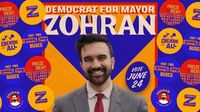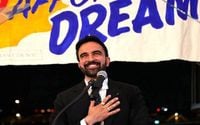As the race for New York City mayor heats up, an unlikely political drama is unfolding that’s captivating the city’s voters and observers alike. On one side stands Zohran Mamdani, a 33-year-old Queens assemblymember and self-described democratic socialist, whose campaign has upended expectations by building a coalition that includes not just progressive Democrats but also a surprising number of Trump voters. On the other side is Andrew Cuomo, the former governor running as an independent, who’s staking his bid on a centrist, pro-business message and warning that Mamdani’s platform is out of step with the city’s economic realities.
According to a Siena College Poll released in August 2025, Mamdani currently leads the mayoral race with a commanding 44% of the vote, outpacing Cuomo, who sits in second place at 25%. This nearly 20-point lead is remarkable for a candidate who, less than a year ago, had name recognition of just 1% when he launched his campaign in October 2024 (as reported by The Journal of Uncharted Blue Places).
But how did Mamdani, with his unabashedly left-wing platform, manage to win over neighborhoods that had swung dramatically toward Donald Trump in the 2024 presidential election? As Mamdani explained in a June interview on MSNBC’s “The Weekend” after his surprise primary win over Cuomo, “So many of our victories were in neighborhoods that went for Donald Trump in the presidential election. We’re talking about College Point or Dyker Heights, so many of the same places we were told that we had now lost voters forever.”
Indeed, the 2024 election saw Trump’s share of the vote in New York City increase by 15 points compared to 2020, with an even more dramatic 21-point swing in Mamdani’s home borough of Queens. While Vice President Kamala Harris still carried the city, the Democratic margin shrank considerably, and many voters—especially those concerned about affordability and economic pressures—appeared open to new political messages.
Mamdani’s campaign seized on this opening by focusing relentlessly on issues of affordability. On his campaign website, he declared, “New York is too expensive. Zohran will lower costs and make life easier.” His platform includes freezing the rent, making city buses fare-free, providing universal childcare, establishing city-owned grocery stores, building more affordable housing, cracking down on bad landlords, and raising taxes on big corporations and the wealthiest New Yorkers. As reported by The Gothamist, these proposals resonated with Democratic primary voters, including many who had previously supported Trump.
In fact, The Gothamist’s analysis found that Mamdani won 30 percent of districts that Trump carried in 2024. His support was strong in Asian and Hispanic neighborhoods, as well as among young voters, including young Black voters—groups where Harris had seen declining support. Ana María Archila, co-director of the New York State Working Families Party, told The Gothamist, “What Zohran's campaign did was not assume that anyone was beyond reach.”
Interviews conducted by The Gothamist in neighborhoods like Flushing and Bensonhurst revealed that many Asian-American Trump voters switched to Mamdani in the Democratic primary. Shirley Wong, a 70-year-old Chinese-American resident of Bensonhurst, said, “I liked his (Mamdani's) policies, mainly his support for education and affordable housing. He seems to listen to us.” Wong had voted for Trump less than a year earlier, citing concerns about the cost of living under President Biden, but ultimately decided, “I changed my mind to choose someone who can help us,” referring to Mamdani.
It wasn’t just economic anxiety that drew voters; many cited frustration over national issues, such as the ongoing crisis in Gaza and the Biden administration’s response, as well as Trump’s unfulfilled promises on affordability. Mamdani, for his part, has not shied away from criticizing both Trump and the Democratic establishment. He recently concluded a “Five Boroughs Against Trump” tour, positioning himself as the strongest candidate to stand up to the president’s “cruel agenda” while emphasizing the need for progressive policies that address the city’s cost of living crisis.
At a campaign stop on Staten Island—the only borough Trump won in all three of his presidential runs—Mamdani told supporters, “Despite the caricatures of this island and the borough, we know that progressive ideas have a home here, and an island that is not immune from the horrific crackdown we are seeing from the Trump administration.” He added, “What separates me from him, one of the key differences, is that I mean what I say. The reason that Donald Trump has threatened to deport me, to arrest me, to denaturalize me is because he knows that when we deliver on this platform it will throw into stark relief his betrayal of those same working class Americans on a message of affordability.”
Mamdani’s authenticity and willingness to engage directly with voters—including those who previously supported Trump—have become hallmarks of his campaign. Videos posted on social media show him listening to concerns in neighborhoods that swung toward Trump, and connecting with ordinary New Yorkers, such as a formerly homeless hotel housekeeper who credited union support for her turnaround. The Hotel Trades Council, which had supported Cuomo in the primary, switched its endorsement to Mamdani following his outreach efforts.
Yet, Mamdani’s rise has alarmed business leaders and establishment politicians. Andrew Cuomo, speaking on Fox News, blasted Mamdani’s “anti-business, anti-corporate” positions, arguing, “If there’s one city where you can’t have a socialist mayor, it’s New York City.” Cuomo insisted that Mamdani’s appeal would “drop dramatically” as voters learned more about his positions, and positioned himself as the candidate of law and order, capitalism, and business-friendly policies. “You can’t have an anti-business, anti-corporate mayor of New York City. We’re nothing without business and corporations, et cetera. It’s why people came here. It’s what made New York New York,” Cuomo said.
Cuomo has also distanced himself from President Donald Trump, despite reports from Politico that he’s counting on Trump and top Republicans to encourage their supporters to back Cuomo over Mamdani. When asked directly if he was seeking Trump’s support, Cuomo responded, “Yeah, no, absolutely not. I take President Trump at his word that he won't get involved.” Cuomo noted that his last contact with Trump was in July 2024, after the assassination attempt in Butler, Pennsylvania, when he reached out to wish Trump well.
Super PACs supporting Cuomo and incumbent Mayor Eric Adams, both running as independents, have raised millions of dollars to fund anti-Mamdani ads. Major media outlets, including the Rupert Murdoch-owned New York Post and Fox News, have launched sustained attacks on Mamdani, while business groups have voiced concern about the direction of the city if he wins. Kathryn Wylde, CEO of the Partnership for New York City, told City & State New York that the business community was “terrified” of Mamdani’s rise, though she expressed willingness to work with him if elected.
Amid these attacks, Mamdani has remained steadfast in his support for marginalized communities, pledging to expand gender-affirming care, make New York City an LGBTQIA+ sanctuary, and protect immigrant rights by ending cooperation with ICE. His campaign has drawn comparisons to Fiorello LaGuardia, the city’s legendary mayor during the Great Depression, who also built a coalition of “outsiders” and immigrants. As Harold Meyerson wrote in The American Prospect, Mamdani’s coalition “can be loosely described as social democrats, but both of them can just as aptly be described as Ellis Island democrats, or more elementally still, as simply New York.”
With the general election approaching, the city faces a stark choice between competing visions for its future. Whether Mamdani’s coalition of working-class voters, immigrants, and progressives can withstand the onslaught from business-backed opponents and media critics remains to be seen—but for now, his campaign has already reshaped the contours of New York City politics in ways few could have predicted.


